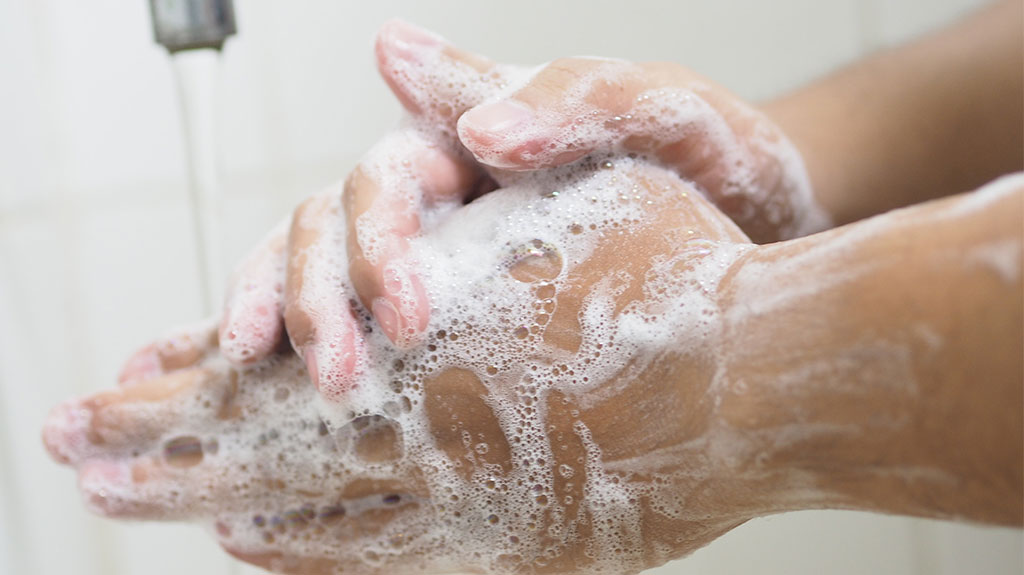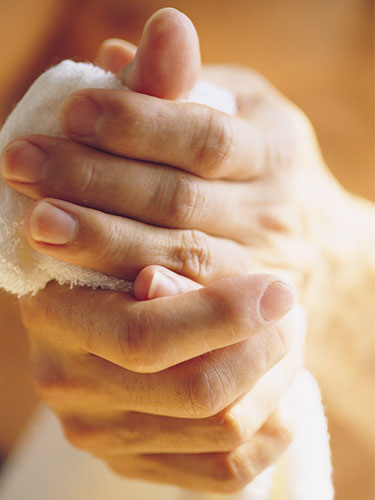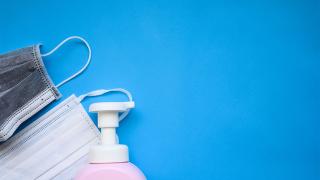Washing your hands, before the COVID-19 pandemic, might have seemed like an afterthought, the most innocuous part of your day. It probably consisted of a quick rinse under a faucet running tepid water — maybe soap, maybe not — and in some cases, not washing at all.

But now, this simple, yet exceedingly important protection against virus transmission is a focal point of many people's day — one of several new or modified habits many of us have adopted to try and avoid infection.
"What most people may not realize is to effectively wash your hands, you have to really work hard to get all the surfaces," said Lisa Feldman, M.D., Ph.D., a neurosurgeon and assistant clinical professor in the Division of Neurosurgery at City of Hope. "You'd be surprised at how much effort needs to be taken to accomplish that, and I think what we surgeons do every day could be instructive."
The following tips from Feldman include things most of us may be overlooking as we turn to more frequently washing our hands to protect against the novel coronavirus circling the globe.
Remove All Jewelry
"The first and foremost thing that all surgeons and all members of the scrub team do before surgery is they remove their jewelry," said Feldman. "So, we do not wear any rings and we do not wear watches. And the reason is, viruses and bacteria can live for a significant amount of time on these objects and most people just don't wash these objects very often.
"So we're essentially 'naked' in the operating room when it comes to jewelry and I would suggest the same for people trying to protect against viruses and bacteria. Especially if you're going to be touching your face: Don't wear jewelry. Just take off your jewelry."

Lather Up
"We use scrub brushes and nail picks to clean deeply, but just as important as those tools is we always use warm water. Number one, it's more comfortable, but secondly, with warm water the soap will lather better and kill bugs better. With the water running, we take the nail pick and we run it under each nail to remove dirt and also any bugs that might be living there.
"You probably don't need a nail pick, but be sure to focus on cleaning under your nails," added Feldman.
"When it comes to the soap, we use a lot of it because the idea is we want a generous lather that's nice and thick. If you're using liquid soap, make sure you have a quarter size in your palm, or if you're using a bar of soap that you rub it vigorously so that you get that thick, generous lather."
Clean All Surfaces Of The Hand
"The third tip is to make sure you're hitting all surfaces of your hands," said Feldman. "I think generally when people wash, they tend to do a sort of wringing motion with their hands and they might forget to go underneath their nails and they might forget in between their fingers, including the web of each finger. You want to make sure that's all washed.
"A good rule of thumb you can take from how a surgeon scrubs is to use least 10 strokes back and forth that cover all of your fingertips. We do that on each side of the fingers. Do the same on the backside of the hands. You want 10 strokes, which cover the entire backside of the hand and fingers. Another 10 strokes on the front side, and then 10 strokes on each side of the fingers, including the web. We do these 10 strokes on the outside of the pinky finger as well."
Surgeon Hand Washing Tips
Wash For At Least 20 Seconds
"A lot of people already know this but it bears mentioning: Just to get into a habit, people should be washing their hands for 20 seconds," said Feldman. "That means they should be singing to themselves, maybe 'Happy Birthday' twice. That's a little bit over 20 seconds but at least it's enough time to wash all these germs thoroughly off your hands in a way that ensures you're hitting every surface."
Do Not Reuse The Same Towel
"The last handwashing technique we use in the operating room is we always use a clean towel that gets discarded after we dry our hands," said Feldman. "So each operation, we're using a clean towel. At home, that's obviously not practical, but I think it's important for people to remember to use clean towels regularly to dry your hands, and not just use the same one over and over again."

'This Is A Wake-Up Call'
The scope of behavioral and public health change occurring right now, which covers much more than improved handwashing, is something Feldman says she marvels at as the world responds to COVID-19. She says rather than viewing what is happening in nations across the globe as a negative, she is in awe of the world's — and individuals' — ability to make change.
"What has sunk in for me is the amazing response that everyone in the world has taken," said Feldman. "I've never in my lifetime seen a situation where people around the world have literally changed their behavior. I personally think it's a beautiful thing.
"This is a wake-up call that we are capable of change. It doesn't need to be a pandemic to make us do it but we can do it."
For more information and resources visit the City of Hope COVID-19 Resource Hub.
